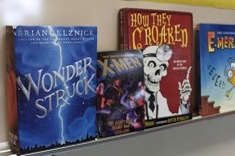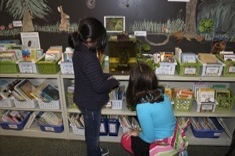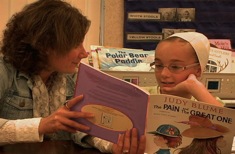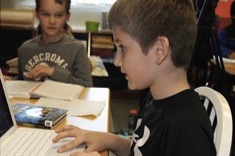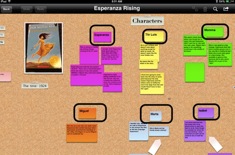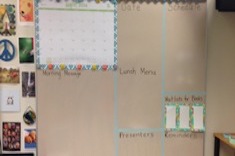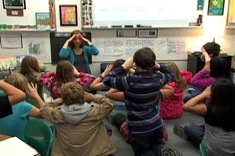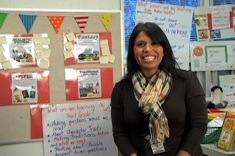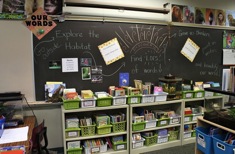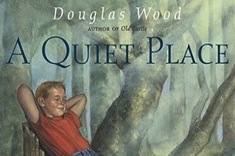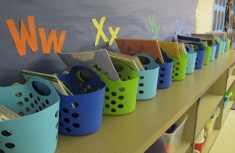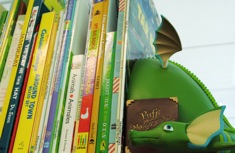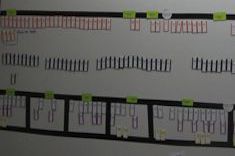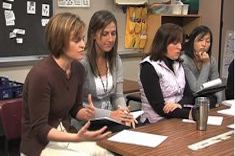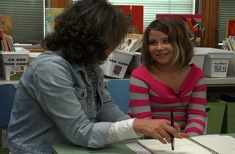3rd
Latest Content
Can Books Harm Children? Support and Censorship
Shari Frost asks a provocative question: Can books harm children? She explores practical ways for teachers to walk the fine line between support and censorship in matching books to students.
Jumping Off the Buzz Wagon: The Value of Reading Logs
Are you ready to ditch your reading logs? Not so fast. Franki Sibberson explains why she still uses them in her third-grade classroom.
Inviting Book Tub Titles: Nonfiction Library Redesign
Andrea Smith discovers the value of more creative nonfiction book tub titles after listening to ideas from her students.
Conferring About Illustrations
Ruth Ayres encourages a young writer to emulate a favorite illustrator.
Reader Response in the Digital Age
Franki Sibberson has suggestions for moving to more digital response options with students.
Digital Boards for Formative Assessment
Katharine Hale has moved much of her reading response to digital boards, which are also a useful tool for formative assessment.
Community Board: Invitations to Independence
Students transition between home and school with the Community Board in Andrea Smith’s classroom. It’s a lively bulletin board that is updated and discussed daily in her fourth-grade classroom.
Independence in Writing Workshop
Beth Lawson uses an LCD, whiteboard, and magnetic clips in a clever way during the transition from minilessons to independent writing in writing workshop. Students tag whether they will be working on drafts or conferring with peers as Beth completes her status of the class on the board.
A Classroom for Elementary English Language Learners
Stella Villalba gives a tour of her classroom library and publishing corner designed to support the grades 1-5 English language learners she works with daily.
Helping Allison Redesign Her Classroom Nonfiction Library
Andrea Smith shares her best advice for library design that celebrates nonfiction as much as fiction.
A Strong Foundation: Books and Media for Launching Literacy Workshops
Help students transition back to school with minilessons that give children a strong sense of the purpose of literacy workshops.
Effective Organization
Ruth Ayres has tips for organizing desks, tables, chairs, and materials to support literacy learning.
“I Used To, and Now I”: An Early Year Minilesson
Franki Sibberson finds an “I Used to and Now I” format helps her third-grade students understand how technology is changing reading habits.
Launching a Sort
Launching a sort with primary students early in the year begins not with words, but with leaves for Max Brand.
Using Summer Reading as Bookends for the School Year
Karen Terlecky has advice for using summer reading for launching and closing the school year to build community and enduring connections with students.
The Rapid Reader: Tutoring Esther
Max works with Esther, a third grader who takes pride in being a rapid reader and rarely pauses to make sense of the text.
The Information Board: Celebrating Nonfiction Every Day
Andrea Smith builds interest in nonfiction in her fourth-grade classroom community through her constantly changing Information Board.
A Booklist for Memorial Day
Sarah Klim’s latest booklist includes titles for honoring those who serve on Memorial Day.
The Data Wall Debacle
Shari Frost has a suggestion for what shouldn’t be on classroom walls: student assessment scores. She explains why this practice can be harmful to students.
Understanding the Summer Slide: Sharing Data with Parents and Students
Clare Landrigan and Tammy Mulligan explain why it is important to share data with parents while school is still in session in order to avoid the summer slide. This is another installment in their summer reading series.
Getting Ready for Summer Reading: A Lesson Cycle
Franki Sibberson designs a lesson cycle to prepare students for summer reading.
Reading Through Spring
Gigi McAllister has many suggestions for a strong reading finish to the school year.
Celebrating Screen-Free Week (BOOKLIST)
Screen-Free Week is scheduled for May 5-11 this year. Here are some book suggestions to help you explore the issue with students.
A Booklist for Earth Day
Earth Day is celebrated on April 22. Sarah Klim presents some favorite titles to share with students and build awareness in this booklist.
Word Observations
Max Brand describes how word observations can work as powerful minilessons in elementary classrooms.
Simplifying Word Study
Max Brand has suggestions for simplifying word study.
Sentence Combining in Workshops
Heather Rader has strategies for using sentence combining in literacy workshops.
A Tool Worth Exploring: Sentence Combining
Heather Rader begins a new series on sentence combining, an alternative to traditional drill and kill grammar instruction.
Collecting Ideas in the Writer’s Notebook
Ruth Ayres confers with third grader Jade about the importance of the “collecting” phase for writers.
Children’s Literature for the Olympics
The Olympics are just around the corner, and Sarah Klim has suggestions for read alouds in a new booklist.
Browse Content By
Type
Category
- Assessment Tools
- Big Fresh Archives
- Booklists
- Choice Numeracy
- Classroom Design
- Common Core
- Community Building
- Conferring
- Content Literacy
- Digital Literacy
- English Language Learners
- Equity
- Family Relations
- Free Samples
- Guiding Groups
- Leadership
- Literacy Coaches
- Mentor Texts
- Minilessons
- New Teacher Mentors
- Podcasts
- Poetry
- Quote Collections
- Reading Strategies
- Self Care
- Struggling and Striving Learners
- Talking and Listening
- Teacher Study Groups
- Teaching Reading
- Teaching Writing
- Word Study and Vocabulary
Author
- Melissa Quimby
- Nawal Qarooni
- Gwen Blumberg
- Julie Cox
- The Lead Learners
- Hannah Tills
- Josie Stewart
- Ruth Metcalfe
- Mallory Messenger
- Becca Burk
- Jodie Bailey
- Vivian Chen
- Mary Brower
- Tiffany Abbott Fuller
- Stephanie Affinito
- Ruth Ayres
- Leigh Anne Eck
- Heather Fisher
- Shari Frost
- Julie Johnson
- Suzy Kaback
- Gigi McAllister
- Shirl McPhillips
- Melanie Meehan
- Cathy Mere
- Debbie Miller
- Tara Barnett and Kate Mills
- Tammy Mulligan
- Dana Murphy
- Bitsy Parks
- David Pittman
- Brenda Power
- Heather Rader
- Matt Renwick
- Mandy Robek
- Christy Rush-Levine
- Gretchen Schroeder
- Jen Schwanke
- Brian Sepe
- Katherine Sokolowski
- Stella Villalba
- Jennifer Vincent
Grade Level
Choice Literacy Membership
Articles
Get full access to all Choice Literacy article content
Videos
Get full access to all Choice Literacy video content
Courses
Access Choice Literacy course curriculum and training

